Judging from the headlines, it sometimes seems no one in Europe wants to help refugees. Record numbers are arriving in Italy and Greece this year, and yet other European governments have agreed to share less than a fifth of them. Hungary is building a wall to keep them out. For the same reason, France has sealed its border with Italy. In Greece, for much of this year there were doubts over the legality of giving a refugee a lift.
But on a local level, there are thousands of people across the continent who are braving the vitriol of their peers, and filling the void left by the politicians. Many Europeans back their governments’ stance but their xenophobia masks another phenomenon – that of a huge drive by ordinary citizens to welcome refugees, rather than reject them. From the Hungarian volunteers providing round-the-clock support to Syrian and Afghani newcomers, to the Spanish priests assisting migrants with paperwork, here are seven movements from across Europe that are fighting for refugees’ rights.
Germany
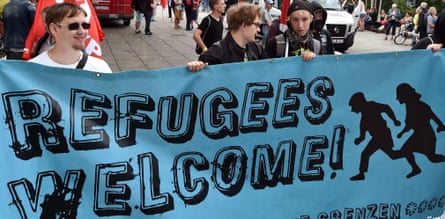
Germany has more people applying for asylum than any other EU country and is this year expecting to receive more than 400,000 applications, more than double the number in 2014. Overcrowding of accommodation is seeing many asylum seekers being housed in tents, sport halls and container villages.
Mareike Geiling in Berlin believes there’s a better way. Last year she decided to offer her room to a friend of a friend who had fled Mali, while she was away in Cairo for a few months.
“It was nothing special – I always tell people these refugees have the same issues and things to do as we do, they have to sleep, they have to eat, they have to shower. He is a very nice person and living together is very normal.”
The experience inspired her to set up Refugees Welcome, a web-based service which has so far placed 63 more refugees in towns and cities around Germany. It also arranges for rent to be paid via benefits where possible, or via crowdfunding if the refugee has no other options.
As well as helping solve accommodation problems, Geiling believes the scheme helps refugees integrate and learn the language, while their flatmates have their eyes opened to the fact that people seeking asylum are no different from anyone else.
“We think this enriches the picture of refugees,” Geiling said.
Not all are so welcoming – attacks on refugee accommodation are an almost daily occurrence – but the town of Goslar in Lower Saxony is attempting Geiling’s welcome on a much larger scale. With a population of 50,000 and falling, the mayor has a plan to reverse its declining fortunes: refugees.
“If we want to retain our wealth, our economy, our jobs, then we need more people. I see the refugees as an opportunity, not as a burden,” said the mayor, Oliver Junk, adding that without an influx of new residents public services would become unsustainable.
“There are lots of people in Goslar who find it positive. But of course there are also people who say, ‘Do something for us, not just for refugees,’” he said. “I try to explain that without these people we would not be able to have infrastructure, swimming pools, schools, our library or our buses.”
Both schemes face challenges. Refugees Welcome lacks the funding to match more than a thousand refugees and potential flatmates who have registered, while Junk says more than 60% of those who come to Lower Saxony are from the West Balkans. “They are not refugees … and 99% of them are rejected – I am neither able nor willing to help.”
But he said that Germany as a whole needs to do more to embrace the opportunity refugees are offering the country.
“There are cities like Hanover, Munich and Berlin that are growing, but almost all over Germany, cities and the overall population are declining. If Germany wants to remain economically strong and prosperous, then it needs immigration.”
Louise Osborne for the Guardian in Berlin
Spain
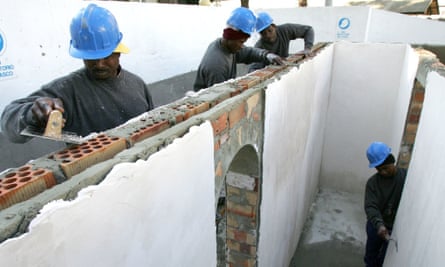
Samuel always tells people that his journey to reach Spain by dinghy lasted two years. That’s how long it took from when he left his home in sub-Saharan Africa, crossed the desert, arrived in Morocco, paid his way across the Strait of Gibraltar and ended up in a shelter in Cádiz.
It was in this gateway to southern Spain that two groups funded by the bishopric of Cádiz welcomed him with open arms. They helped him learn Spanish and integrate into the local culture.
Programmes run by the Tierra de Todos (Everyone’s Land) foundation and Cardijn association helped 3,536 people last year, but Fr Gabriel Delgado worries their efforts are minute given the increasing numbers now arriving.
He said his work stems from a basic conviction, that “immigrants are people, with the same dignity and rights as you and I”.
Many of the newcomers attend courses on first aid and languages, as well as care for the elderly, retail or hospitality sector skills. When Spain’s economy was booming, courses on construction would allow the immigrants to find work.
“We give them tools so that they have options like everyone else,” says Delgado.
There is also a reception programme that offers a flat for long-term stays, geared to young people who need a place to stay for several months while their situation stabilises, and an emergency service that houses people for one to two weeks, allowing those who have recently arrived in dinghies to recover, contact their loved ones and benefit from a human touch.
That touch is what’s missing in Spain’s temporary migrant accommodation centres, such as the one in Tarifa, southeast of Cádiz, said Delgado. “There they are treated as if they had committed a serious crime. They take away all their rights. They should close the centres and come up with other formulas.”
His colleague Santiago Yerga periodically visits theaccommodation centre in Tarifa and it is there that he has noticed that many of those arriving are not the traditional migrants who are escaping poverty in search of a better life. Instead they are escaping to save their lives.
“They’re refugees, people who have rights according to international agreements to receive asylum in Spain but they aren’t being treated as such,” says Yerga.
The bishopric of Cádiz and local authorities are working together to prepare a video to raise awareness so that these people can claim their rights.
Pedro Espinosa of El País in Cádiz
Hungary
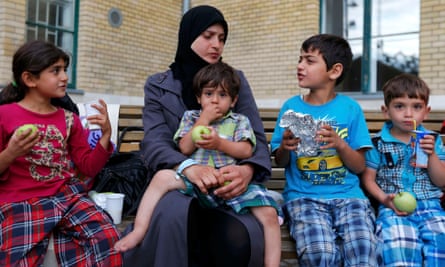
Civil groups have been springing up all over Hungary in recent weeks, as Hungarians rally to provide food and clothing to the beleaguered migrants entering the transit country across the border with Serbia.
The first provincial Migszol (Migrant Solidarity) group was formed in Szeged, southern Hungary, when five friends noticed that migrants – mainly Syrian and Afghan refugees – were being locked out of the city’s railway station overnight.
Migszol Szeged co-founder Márk Kékesi said: “In mid-June it was surprisingly cold and they had no blankets or warm clothes: among them were kids, sometimes babies, so we made a pot of hot tea and brought warmer clothes.
“The next day we created the Migszol Szeged Facebook group and were truly amazed: people started to join instantly: the group had 1,000 members within three or four days, it became known nationally and donations began to arrive in large amounts.”
The group now has over 2,500 members. A core of about 200 volunteers provide round-the-clock support to 400-800 migrants each day, from a wooden hut provided by the city council. Szeged is also covering electricity and water bills, although Kékesi is keen to stress that the initiative is not aligned to any political party.
Although the group has received between 5m and 6m forints (£11,500-£13,800) in donations, it mainly requests non-financial aid. “We often write in the Facebook group something like ‘we are running low on apples’ and people bring them, fortunately,” volunteer and student Mária Volkov said.
Students from the city’s medical school are also regular visitors. “One student medic comes almost every day, while we help out with conditions such as nettle stings: its a small thing, but they [migrants] are afraid and it helps them to relax,” Volkov said.
Szeged-born education technician Dániel Szatmáry said his time living in the UK taught him that “more nations means more experience. We can hear their stories: an 18-year-old Syrian guy told me that he had left because his parents and three sisters had been killed. The first afternoon I had planned to stay for 30 minutes, but I was there until six in the morning, and my life began.”
Szeged is the only major Hungarian city not controlled by Prime Minister Viktor Orbán’s Fidesz party, which has a starkly different stance on migrants.
Fidesz recently ran an anti-migrant billboard campaign as well as a national consultation on “immigration and terrorism”. The latter, which cost 1bn forints, has been widely criticised as promoting xenophobic opinion and was also shunned by Hungary’s voters, seven-eighths of whom declined to respond despite a deadline extension.
Regardless, an Orbán government spokesman claimed on Monday that the poll has given it a legitimate mandate to strengthen anti-migrancy laws, as 61% of respondents had answered that they see a link between “the expansion of terrorism” and “Brussels’ poorly controlled migration policy”.
But according to one Migszol volunteer, Szeged’s status as a border and university town has made its residents “less manipulated by government campaigns … and more interested in different cultures”. Whatever the politics, the Migszol movement has now gone national, with initiatives in Budapest, Debrecen, Pécs, Bicske and several other towns. Meanwhile, the similar Migration Aid group has amassed over 7,000 Facebook followers.
Éva Borsi has been working 12-hour days for Migszol Budapest since joining a month ago. “It has been amazing to see Hungarians working together, and to see the donations flowing into Szeged is wonderful, like a little revolution,” she said.
Dan Nolan for the Guardian in Budapest
Italy
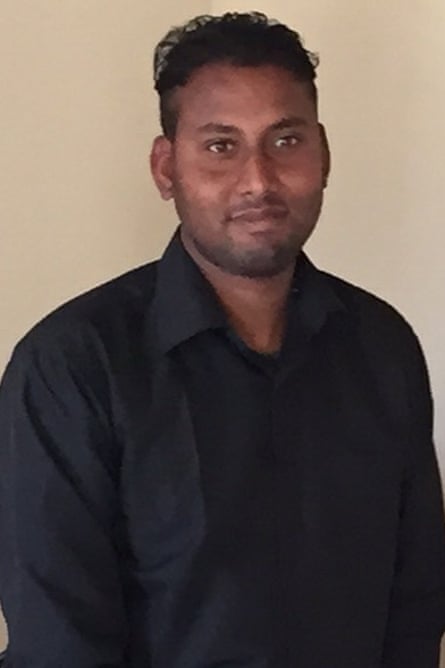
Abu Taleb Mridha has to go home. He will have to say goodbye to the little village of Capriglio in the southern Piedmont region, with its 281 inhabitants, located in northern Italy, and to return to Bangladesh. His future has been decided by the commission in Turin that determines the fate of asylum seekers. The 23-year-old has no permission to stay in Italy, even though the villagers are adamant they want him to remain.
“Taleb must stay and we will do everything possible to make that happen,” said Capriglio’s mayor, Vittorina Gozzolino, who, together with a neighbouring mayor, priests, local NGOs, and people from the area, have started a committee, “Taleb is one of us”.
The group has decided to appeal against the deportation proceedings against Mridha. “Maybe we can not solve the immigration problem as a whole, but certainly we can resolve the situation facing Taleb,” the promoter of the initiative, Elisabetta Serra, said.
Mridha had no shortage of positive references – a letter from the mayor and the traders association, and from a pastor and the teacher of a local Italian school.
Bangladesh is not among the countries whose citizens are entitled to humanitarian assistance in Italy. Yet Mridha’s story is common to thse of many other migrants fleeing towards the coasts of Europe. He was tortured in Sudan for having a false passport and was imprisoned, and endured that heatof the Libyan desert to reach the coast and embark.
Mridha said: “Now I want to die here in Italy, in Capriglio. It’s better than returning to Bangladesh. If I went back in Bangladesh before having paid the debts I would be killed because I am the eldest son. My father is still alive only because he has a disability. And the law. Our law. But yours, the Italian law, is no less ruthless.”
Laura Secci of La Stampa in Asti
Greece
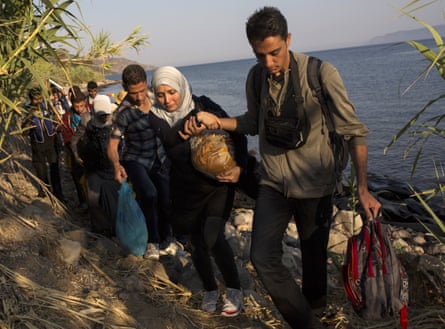
Squinting across the six miles between the Greek island of Lesbos and the Turkish mainland, Eric Kempson has spotted something. “See that?” he said, pointing at a speck in the distance. It’s barely visible, even in the dazzle of the 6am sunrise, but Kempson knows what it is. “That’s a boat of refugees, and it’ll arrive on this side in about 15 minutes.” And sure enough, it does, leaving its 50-odd Afghan and Pakistani passengers to haul themselves up a craggy scree to reach the road above.
Lesbos has become the Lampedusa of Greece, with more than 1,000 refugees like these arriving daily. The Greek authorities, struggling to deal with an economic crisis, cannot cope with the influx – so the vacuum has been filled by volunteers such as Kempson and his wife, Philippa. Boats arrive just metres from the Kempsons’ front door, and as a result the British couple have become what a medic might call the island’s “first responders”.
“The refugees just need help when they come in, they’re shellshocked,” said Eric Kempson. “So the first thing we do is take the wet clothes off people and give them dry clothes, and then give the mothers hot water-bottles, so she can put it between her and the baby, and keep the baby warm.”
It’s a team-effort, caring for the migrants. Once the refugees are out of the boats, the president of the local village, Thanassis Andreotis, comes to clear away their abandoned rubber dinghies. There are locals who think the migrants should be left to their own devices, and be discouraged from coming. But Andreotis is not one of them. “It’s a matter of humanity,” said the retired policeman, hauling the remains of a boat from the beach. “You have to get out there and do something. The people who complain about it are just sitting in their lounges, and coming up with crazy rumours.”
After they have left the boats, the newcomers face a 40-mile walk to get to the government-run camps. Even if they get there, there is rarely enough space or food. So locals have set up their own volunteer-run camps. One is the Village of All Together, co-founded by Efi Latsudi. On the site of an old scout camp, Latsudi and her team have created temporary housing for about 80 migrants. “We cannot stay watching hundreds of people with their children – walking, lying in the streets – and let them die there under the sun,” she said. “It’s impossible.”
On the other side of the island, Australian-Greek restauranteur, Melinda McRostie, has done something similar. Behind her restaurant, the Captain’s Table, she has set up a makeshift migrant camp for 150 people. She gives them three meals a day, using donations from tourists and locals alike. It is exhausting, but there is no alternative, she said. “It’s obvious that it’s not something that’s going to stop, so the only obvious thing to do is to do something about it.”
Patrick Kingsley for the Guardian in Lesbos
UK

In an unassuming old shop on the corner of a street near the Scottish Home Office, the Unity centre has been fighting for several years to protect refugees and asylum seekers who have made their home in Glasgow.
Asylum seekers come in and report to Unity before signing in at the Home Office building nearby. If they are detained during their visit to the Home Office, activists can swing into action to try and get them released. It’s a system that has helped hundreds stay in Scotland since asylum seekers started arriving in Glasgow at the end of the 1990s.
“Glasgow has stood against the Home Office in lots of ways,” said one Unity activist who did not want to be named. “We help anyone in their struggle for papers, it’s about emotional solidarity as well as practical.” He talks about a flight full of migrants that has only this morning left Heathrow for Nigeria, stopping en route in Ghana, Liberia and Sierra Leone.
“Charter flights are a way of expelling people en masse, where nobody can hear you scream. We know several of the people who have been sent out on this flight and many of them have legal processes open, they have families and children here. The Home Office just grab as many people as they can,” the activist added.
The Unity centre is only one part of a vibrant network of support for migrants and refugees across Glasgow, rooted in local communities and bringing together people from around the world with their Scottish neighbours.
When the Home Office decided to start sending asylum seekers out of London to cities around the UK, Glasgow city council was the first to sign up. Little did the Home Office know what they were getting themselves into.
The asylum seekers were placed in empty flats in long neglected high-rise estates. Neighbours appointed by the council to welcome the new families took the job seriously, bringing the new arrivals from Kosovo, Pakistan, the Democratic Republic of Congo, into their communities, holding parties, bringing families from across the world together. When families were told they would not be given asylum their Scottish neighbours refused to let the Home Office remove them from the UK. Immigration officials who arrived in the early hours for “dawn raids” on families were met by enraged Glaswegians who refused to let the Home Office take their new friends away.
The demonstrations became widespread and saw the end of the dawn raids. Many thousands of people who had been threatened with removal, including many families, were allowed to stay in Scotland.
In the Maryhill area of Glasgow, a part of the city that still receives many asylum seekers, Remzije Sherifi runs the Maryhill Integration Network where people from around the world come together in award winning dance and music projects.
“We have established great links between new arrivals and local people. This grows organically from the heart if people can understand why someone would have to flee their country. It’s still hard, there are still people struggling, but there are always doors open where they can get a cup of tea.”
Harriet Grant for the Guardian
France
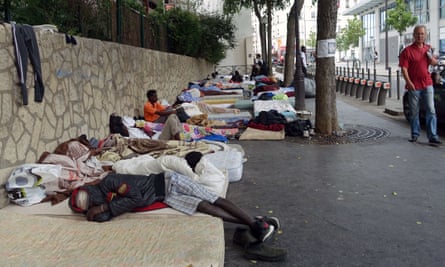
For many years now, on her way by bike to the working-class northern districts of Paris where she works, Isabelle Pépin’s gaze has lingered on the pavements strewn with mattresses. Each evening, after a day of consultations in her GP’s surgery, the newspapers have sent her back to same nagging question:
“What am I, Mme Pépin, 56 years old, six children, actually doing to make foreigners welcome in France and help them become better integrated?”
Nine months ago, she got the beginnings of an answer. “Last autumn, two of our children left home,” she said. “We suddenly had a spare bedroom. We decided we wanted to offer it to a young asylum seeker.”
At the Paris parish of Saint Merry to which and her husband, Philippe, belong, Pépin had heard of the Welcome to France project run by the Jesuit Refugee Service (JRS). She had no intention of cutting any corners and laying an extra place at the family table without the agreement of the four teenagers still living at home. “Everyone had to be able to ask their questions openly, express their fears,” Pépin said.
She began by inviting the project leader. Nine months later, Ghaith, 26, from Syria, is the fourth guest to benefit from board and lodging, after Abdullah, an Afghan and Ali, an Iranian. He arrived in early July and will stay all summer, although Welcome’s rules stipulate no stay should exceed five weeks.
“We offer temporary lodgings with families to asylum seekers to whom the state provides nothing,” said Pierre Nicolas, general secretary of the JRS, which also organises French lessons, meet-ups and clothing exchanges for asylum seekers.
Although the law supposedly guarantees it, barely half of all asylum seekers in France have access to accommodation. Fresh legislation was recently passed that should improve things, but in the meantime, Welcome’s 105 host families last year provided more than 6,200 nights of accommodation – each one a night less on the street for a migrant. Operational since 2010, the network was initially confined to Paris but has been expanding since this spring to take in a number of medium-sized cities – Dijon, Bordeaux and Valence are now among the 15 or so to have their own Welcome project.
“Sometimes, in Toulouse for example, it has taken off remarkably quickly,” said Nicolas. “And in Rennes it is entirely independent from the Catholic church – a secular group has successfully copied the model to create an organisation called Bienvenu en France.”
Nine months after welcoming her first guest, Pépin said she appreciates the presence of people from other continents in her home. “I like the way these meetings confont you with yourself, and with social reality,” she said. “We have welcomed three very different people. Each time, their approach to society has tested our own limits.”
For the migrants, it’s a home from home. “I appreciate the fact that my history is respected here and that people are available to answer all my questions,” said Ghaith. Over breakfast, at 8am, he raises his first questions of the day – the fruit of two hours morning French study. “I have to learn the language very fast,” he said, speaking well-structured French after only four months in France.
Pépin said immersion in a family is “the most efficient way to integrate. That’s what satisfies me about the whole Welcome project. It’s a way to rectify, on a small scale, the problems French society has in integrating new arrivals.”
Maryline Baumard of Le Monde in Paris
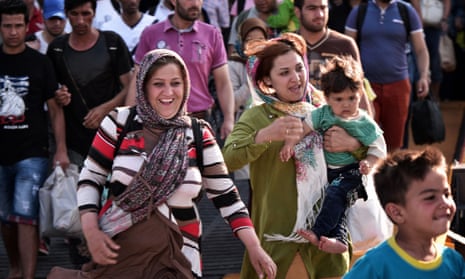
Comments (…)
Sign in or create your Guardian account to join the discussion